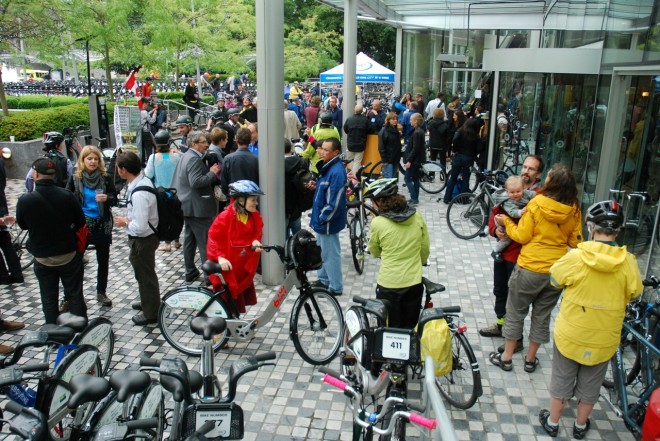
Epilogue - Velo-city Global 2012
Velo-city Global 2012: Delegates, bikes, more delegates, and more bikes. Photo © Veloworks Cycling Society.
Thanks to Gil Peñalosa, Velo-city Global 2012 started off with a bang. Rather than just congratulating Vancouver on its accomplishments towards greater liveability for its citizens, Peñalosa called the city to task on its relatively timid pursuit of cycling infrastructure. Peñalosa issued the challenge, and in so doing, threw down the gauntlet, jump-starting the discussions that would resonate over the next four days.
As with many discussions on furthering cycling in the collective stream of city planners’ and engineers’ stream of consciousness, Copenhagen provided leadership, and inspiration. Almost on cue, a Gil Peñalosa cue, Technical and Environmental Committee member Lise Thorsen shared Copenhagen’s latest vision: the implementation of a cycling super highway system. Copenhagen, timid? Absolutely not.
Further examples of leadership, both with, and without strong political support came from Korea and Mexico respectively. Changwon City Mayor Wan-Su Park spoke of how his industrial city was staking its claim in the rush for a greener existence. While Dr. Gabriel Lagos, Director of Sustainability for Casas GEO, represented the efforts of a private company in not only recognizing the importance of cycling infrastructure, but in providing it within its own developments, and of its own accord.
Further inspiration came from perhaps a most unlikely source, Senator Rodney Ellis of Texas. From deep in America’s energy belt came support for cycling as a universally available transportation option. And, how do you keep a politician’s attention on matters like cycling? According to the senator, it’s as easy as “keeping the cameras in the room.” But, along with that assertion came the recognition that in order for cycling to grow, and truly be seen as the great equalizer, the cycling message needed to reach visible minorities within the population.
That message, although rooted in the senator’s local reality, had relevance on a global scale, as was witnessed by the attendance of a delegation from Nigeria. Representative of many of the underdeveloped, and developing nations around the world, Nigeria’s Road Safety Corps not only saw cycling as a viable transport option, its Marshall and Chief Executive Mr. Osita Chidoka labeled cycling an economic imperative for his nation, and nations like it.
When it came to the use of bicycles in the combined mobility discussions, some transit and transportation professionals were pragmatic. Montreal’s STM Chair Michel Labrecque and Copenhagen’s DBS S-tog’s Aske Wieth-Knudsen seem to agree they were ultimately in the business of selling tickets – moving people in effect, meeting the needs of their “customers”. TransLink’s Bob Paddon stressed the need to provide options, with Canadian Urban Transit Association President and CEO Michael Roschleau emphasizing balance as well. It all made perfect sense.
Then, invariably the question rose: why is there still such difficulty in promoting cycling infrastructure in much of the world? “Why so slow?” as Peñalosa would lament? Well, maybe it takes someone like Paul Tranter to connect the actions necessary to further cycling with other irrefutable human desires – such as protecting and nurturing our young, our children.
The unveiling, and signing of the Charter of Vancouver, a document linking cycling to children’s rights, seemed the perfect embodiment of Tranter’s thoughts, and a fitting precursor to the official closing ceremonies, and official handover to Vienna, host of next year’s Velo-city 2013.
From a media perspective, it was heartening to hear members of the press surprised. Surprised at why more press weren’t covering such an event. It was an embarrassment of riches from a story, and informational point of view. And surprising in that the normal “helmet debate” stories had a small place here – indicative of their true relevance when discussing the true issues surrounding the need for greater cycling infrastructure. Even more so, surprising in the absence of a decidedly anti-car, cycling at all costs debate. The discussion did not devolve to that polarizing place where the real issues are clouded, if not completely obscured. The point understood was that more cycling infrastructure would benefit everyone – including vehicle drivers.
Given the personalities in attendance, some of them truly magnetic, and based on the conversations that occurred organically in the press area after their sessions, I can envision the inclusion of such open discussions as a potential element in future Velo-cities. For those of you familiar with televised cooking competitions, picture an inspirational, cycling motivated “smack down” of sorts.
What if conference organizers invited Gil Peñalosa, Michel Labrecque, the “Senator”, ITF Secretary General Michael Kloth, Paul Tranter, and the ECF’s Kevin Mayne – and just let them talk - for an entire morning? Imagine.
True, there might not be a venue large enough for their personalities, their vision. They would come from different places, with perhaps different expertise, or even focus. But, the energy would be electric, the thinking unquestioned, the air charged, and ultimately, the message in sync.
The audience would be mesmerized, transfixed, and everyone would be listening. Like a symphony orchestra where musicians approach a musical piece from a direction dictated by, and relevant to their particular instrument, the speakers would create their wall of cycling related sound as they, together, reach their crescendo. Vienna, host city whose beautiful promotional film epitomized “the sound of cycling”, are you listening?
 The curtain closes on Velo-city Global 2012. Photo © Andrea Sirois Photography.
The curtain closes on Velo-city Global 2012. Photo © Andrea Sirois Photography.
About the Author
Vancouver resident Mark Mauchline has worked as a producer and director on critically acclaimed, award-winning television series, and documentary films since 2003 and has bicycled, hiked and paddled in thirty countries on five continents. He is the current Communications Manager for the Velo-city Global conference in Vancouver.
Contact the author
Recent news!
Upcoming events
Contact Us
Avenue des Arts, 7-8
Postal address: Rue de la Charité, 22
1210 Brussels, Belgium











